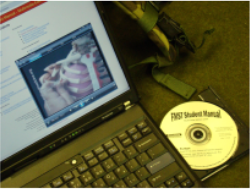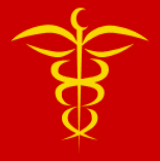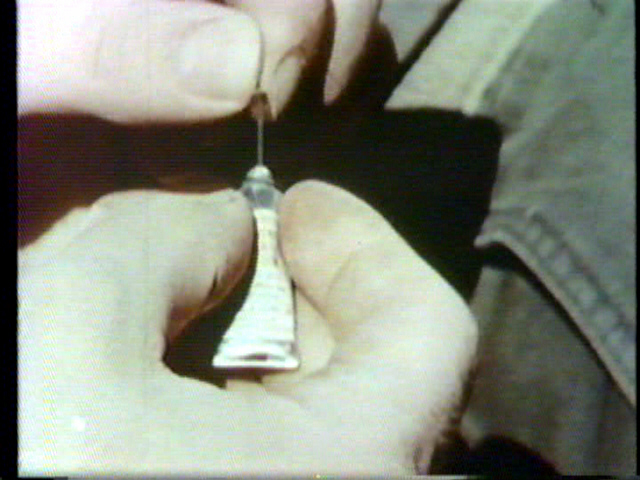Hospital Corpsman Sickcall Screener's Handbook
BUMEDINST 6550:9A
Naval Hospital Great Lakes
1999
Your Command: Student Handout, Pharmacy
GAIN ATTENTION: During normal routine the CA will be called upon to properly prescribe and dispense medications in the proper manner.
|
 |
|
Operational Medicine CD
Text, images,
videos and manuals
The essential text for military healthcare providers
www.brooksidepress.org |
PURPOSE: The purpose of this lesson is to familiarize the student with common medications and the trade name, indications, contraindications, side effects and dosage of those medications.
INTRODUCE LEARNING OBJECTIVES:
-
TERMINAL LEARNING OBJECTIVE: Given the need to prescribe and dispense medications, the student will be able to do so in the proper manner. -
ENABLING LEARNING OBJECTIVES:
-
Be able to identify generic and trade names of meds by selecting the correct response. -
Be able to identify the indications and contraindications of a specified medication by selecting the correct response. -
Be able to identify the side effects of any medication by selecting the correct response. -
Be able to identify dosages of meds by selecting the correct response. -
Be able to identify different classifications of meds by selecting the correct response.
-
The instructor will give this class by lecture and demonstration. -
This material will be covered on a daily quiz and the final oral exam.
The dispensing of any medication to a patient must be accompanied by an understanding of that medication. Even properly prescribed medications can cause side effects ranging from mild discomfort to potentially fatal consequences.
Note: If you do not know what is in a medication, how, why and when to use it, and what the side effects are, then you should not use that medication.
OUTLINE SEQUENCE
-
DRUG CLASS -
Generic name and type of medication. (Trade name) Most medications have a trade name (i.e. Tylenol) along with the generic name (i.e. Acetaminophen).
-
Indications: -
The specific reason(s) the medication should be prescribed for.
-
Contraindications: -
The specific reason(s) the medication should not be prescribed for.
-
Side Effects: -
All medications cause effects other than those desired such as an upset stomach when taking aspirin. Some are serious, others are mild. A knowledge of possible side effects before giving a medication can save you and the patient problems later.
-
How to take this medication: Special instructions that the patient should know while taking this medication (i.e. eat food when taking Motrin). -
Dosage:How much, how often and for how long should the medication be given.
-
Medications in this class of drugs available at FCAC
NON-NARCOTIC ANALGESICS, ANTI-INFLAMMATORY and ANTIPYRETIC DRUGS
-
Aspirin (ASA, Ecotrin) Aspirin is the most economical analgesic, atipyretic, and anti-inflammatory agent available. Some preparations have an antacid-type buffer to assist in the reduction of gastric irritation.
-
Indications -
Relief of mild to moderate pain. -
Control of inflammation. -
Control of fever.
-
Contraindications -
Hypersensitivity and/or history of allergic reaction to other anti-inflammatory medications. -
Peptic ulcer disease. -
Scheduled for surgery or tooth extraction. -
Bleeding disorders, if on anticoagulant medications, or during the last three months of pregnancy.
-
Side Effects -
Most commonly GI: nausea/vomiting, gastritis, GI bleed, usually reduced if taken with meals. -
Tinnitus/vertigo -
Anaphylaxis -
Decreases platelet aggregation and increases bleeding time.
-
How to take this medication: Take with food or after meals to prevent stomach upset. Take with a full glass of water to help swallow the medication. Sustained release or long lasting preparations must be swallowed whole. Do not crush or chew them or the sustained activity may be destroyed and side effects increased. -
Dosage:Adults 650 mg q4o with food.
-
Ibuprofen (Motrin)
-
Indications -
Relief of mild to moderate pain and reduces inflammation. -
Used to treat headaches, muscle aches, dental pain, menstrual cramps and athletic injuries. -
Used to treat pain, swelling and stiffness associated with arthritis. -
May also be used to reduce fever.
|
|
Approved for public release;
Distribution is unlimited.
The listing of any non-Federal product in this CD is not an endorsement of the
product itself, but simply an acknowledgement of the source.
Bureau of Medicine and Surgery
Department of the Navy
2300 E Street NW
Washington, D.C
20372-5300 |
Operational Medicine
Health Care in Military Settings
CAPT Michael John Hughey, MC, USNR
NAVMED P-5139
January 1, 2001 |
United States Special Operations
Command
7701 Tampa Point Blvd.
MacDill AFB, Florida
33621-5323 |
*This web version is provided by
The Brookside Associates Medical Education Division. It contains
original contents from the official US Navy NAVMED P-5139, but has been
reformatted for web access and includes advertising and links that were not
present in the original version. This web version has not been approved by the
Department of the Navy or the Department of Defense. The presence of any
advertising on these pages does not constitute an endorsement of that product or
service by either the US Department of Defense or the Brookside Associates. The
Brookside Associates is a private organization, not affiliated with the United
States Department of Defense.
Contact Us · Other
Brookside Products

|
|
Operational Medicine 2001
Contents
|
|
 |
|
FMST Student Manual Multimedia CD
30 Operational Medicine Textbooks/Manuals
30 Operational Medicine Videos
"Just in Time" Initial and Refresher Training
Durable Field-Deployable Storage Case |
|




